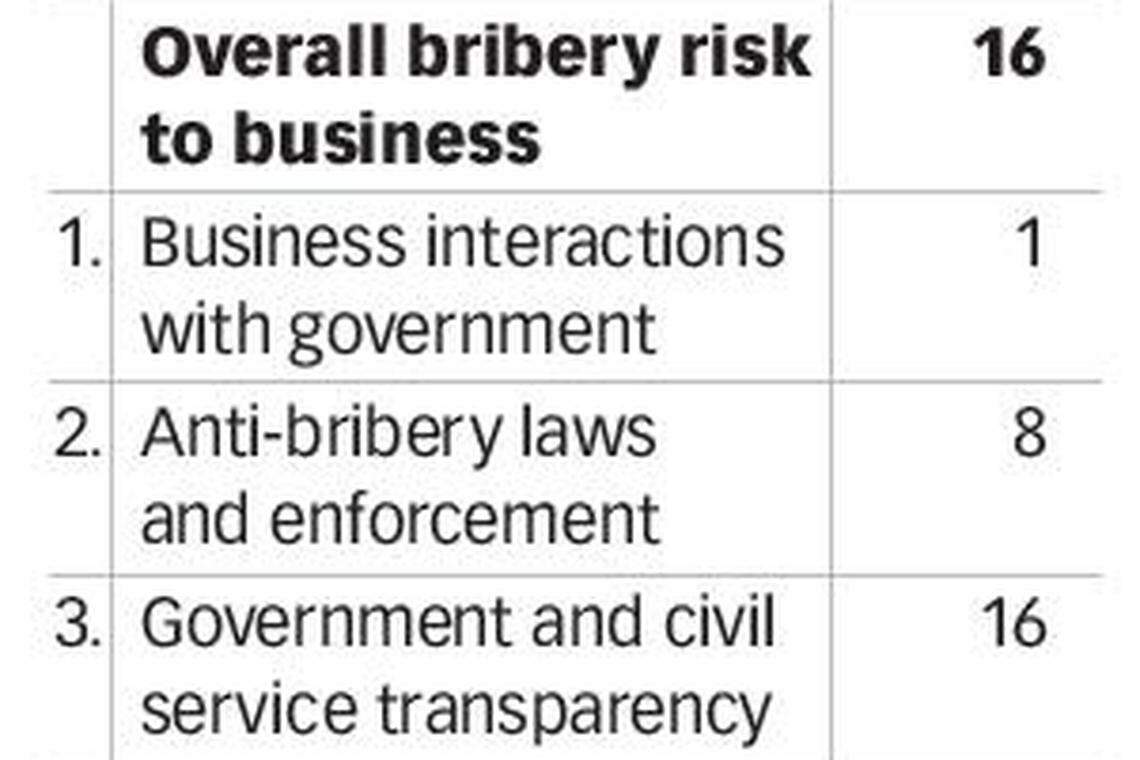Singapore ranked 13th among 200 countries for low bribery risk

Singapore
SINGAPORE has emerged 13th in a field of 200 countries, ranked according to the risk of encountering commercial bribery.
The 2017 TRACE Bribery Risk Matrix, a global business bribery risk-assessment tool, thus categorises the city state as "very low" in terms of risk of business bribery or, in other words, corruption-related concerns.
The risk-assessment tool created by TRACE International, an anti-bribery standard-setting organisation, guides companies in gauging the risk of commercial bribery worldwide, as well as within each country.
Sweden, New Zealand and Norway were among the five least-risky countries, along with newcomers Finland and the United Kingdom. The five riskiest for bribery were Somalia (ranked last among the 200 countries), Venezuela, Turkmenistan, North Korea and South Sudan.
Hong Kong took the 15th spot, and the US was ranked 16th.
The countries were ranked according to a set of four domains; the higher the score, the higher the risk of business bribery.
In terms of "business interactions with government", Singapore received a "very low" score of one, based on a very low degree of government interaction, very low expectation of bribes, and very low regulatory burden.
The Republic also scored "very low" - eight - on the "anti-bribery laws and enforcement" component, given the high quality of such laws and enforcement and a "very low" score of 16 for "government and civil services transparency".

The highest score among the four domains came from a "medium" score of 46 for "capacity for civil-society oversight", based on the degree of media freedom/quality and a high degree of social development, said TRACE Matrix.
Alexandra Wrage, president of TRACE International, said: "Singapore is a fairly unique case for bribery risk. For example, it combines a very business-friendly environment domestically with low civil-society engagement."
She pointed out that Singapore has garnered its share of headlines recently, from the Glenn Marine scandal and the role that representatives of the US Navy played in that.
"Overall, however, Singapore remains near the front of the global pack, and certainly at the head of the pack in Asia."
Essentially, the TRACE Matrix is designed to reflect each country's current risk profile - that is, the likelihood that a company will experience bribery demands - as accurately as possible.
Ms Wrage said top-level risk scores are markedly lower this year, primarily because of changes in the methodology and data inputs rather than a drop in corruption levels.
In some cases, however, reform efforts and changes in country conditions have resulted in improved scores. In India for example, a big recent drop in expectation-related indicators and significant improvements in cutting red tape for establishing utility services has had a significant impact on lowering (that is, improving) the country's overall risk score.
As a continent, Asia's average risk score is 52, placing it ahead of South America and Africa, but behind North America, Oceania and Europe.
One of the interesting themes for Asia over the next few years will come from China's Belt and Road Initiative, which represents a massive investment in some of the world's most challenging jurisdictions, she added.
BT is now on Telegram!
For daily updates on weekdays and specially selected content for the weekend. Subscribe to t.me/BizTimes
International
Japanese AI tool predicts when recruits will quit jobs
India votes in gigantic election dominated by jobs, Hindu pride and Modi
Britain’s retail sales disappoint in sign of lacklustre recovery
Explosions in Iran, US media reports Israeli strikes
US veto sinks Palestinian UN membership bid in Security Council
Pro-China local leader ousted in Solomon Islands election
